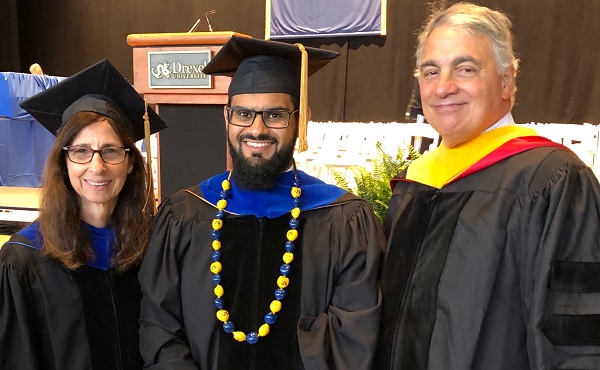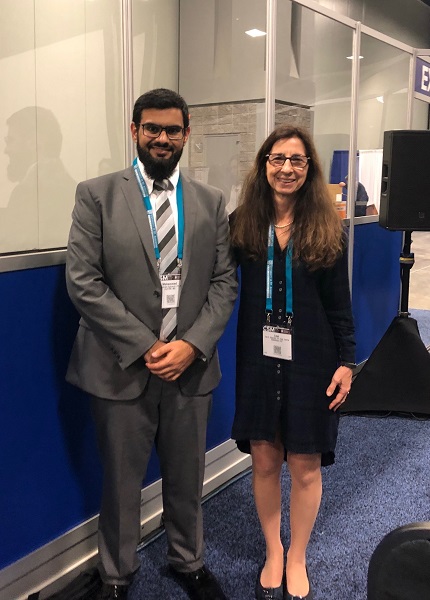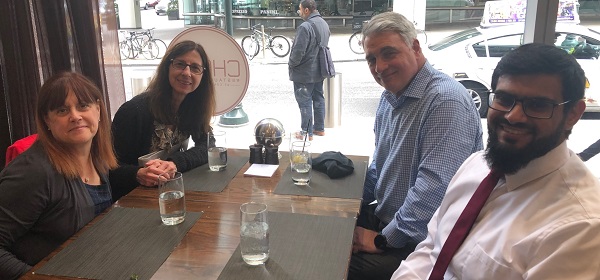PhD alumnus better prepared for teaching through COVID
August 27, 2020
 Mohammed Alghamdi, PT, MS, PhD, was equipped to assume the role of chair of the physical therapy department nine months ago at Umm Al-Qura University in Saudi Arabia after receiving his PhD in Pediatric Physical Therapy in 2019. He probably didn't realize how well an education from CNHP's Physical Therapy and Rehabilitation Sciences department prepared him to handle a halt to in-person classes and move to online education in the face of a pandemic.
Mohammed Alghamdi, PT, MS, PhD, was equipped to assume the role of chair of the physical therapy department nine months ago at Umm Al-Qura University in Saudi Arabia after receiving his PhD in Pediatric Physical Therapy in 2019. He probably didn't realize how well an education from CNHP's Physical Therapy and Rehabilitation Sciences department prepared him to handle a halt to in-person classes and move to online education in the face of a pandemic.
When Alghamdi enrolled as an undergraduate student at Umm Al-Qura University in 2006, the physical therapy program was brand new, having only 21 students. Physical therapy was not a passion, per se, but he was aware of what career opportunities it would afford him. "I remember my father questioning my choice of physical therapy, but my response was this is a new program and there is a potential job future for this profession. So, I will stick with it," Alghamdi recalled. His interest in pediatric physical therapy developed during his internship after he graduated in 2010. Still, even before that, Alghamdi was drawn in that direction because he has two family members with cerebral palsy. While working as a teaching assistant at the University, he was offered a scholarship to pursue advanced education. And that is where his journey toward the College of Nursing and Health Professions began.
Being accepted into the PhD program at Drexel was a dream. Since he did not meet the requirements to go into the program right from an undergraduate degree, he pursued a master's degree in neuromuscular physical therapy at the University of Pittsburgh before returning his sights on CNHP. "I went there in 2013 and finished the program in 2014. I still had the passion to join Drexel," Alghamdi shared. "Why, you may ask. Because of the big names—Lisa Chiarello, Bob Palisano, Margo Orlin, Maggie O'Neill. These are internationally recognized names in pediatric physical therapy," he added. Alghamdi was encouraged to apply by Lisa Chiarello, PT, PhD, a professor, associate director of Center for Family Intervention Science, and director DHSc Program in Rehabilitation Sciences, who he met in 2014 at the American Physical Therapy Association conference. Once he was accepted, Alghamdi dove right into the PhD program.
There are a number of things that impressed Alghamdi about his experience at Drexel. One of them is the plan of study. He shared that the plan is both structured and flexible—something that fit his needs perfectly. Students have a structured plan of study, but they also have the freedom to select specific courses and experiences that they might need for their individual interests. "I'm a physical therapist, but my plan of study included courses in psychology and family therapy. These complemented my research, which focuses on family caregiving for children with disabilities," stated Alghamdi. "So, I took those courses just to have a collective understanding of what other disciplines are thinking about these specific topics. It's a plan that is beautifully designed," he furthered.
Faculty mentorship is another factor that impacted Alghamdi. "I might be one of the most fortunate people at Drexel to have had a nationally recognized mentor—Lisa Chiarello. She received the Jeanne Fischer Distinguished Mentorship Award from the American Physical Therapy Association recently," he gushed. Another of his committee members, Sally McCoy, PT, PhD, a physical therapist and head of the Division of Physical Therapy at the University of Washington, received the same award in 2018. "I was very fortunate to have been mentored by both world-recognized names in research and award-winning mentors. They have really influenced the way that I would mentor my own students." Chiarello and Alghamdi would meet every Thursday to discuss or conduct research. "I've made so many sweats because she worked me so hard. But it paid off. It paid off," he explained. He claimed that few people experience this kind of interaction with their research mentors. In fact, in describing his one-on-one encounters with Chiarello to many of his colleagues now in their own PhD programs, they commented, "well, this is the utopia of research!"
Alghamdi also found his relationships with PTRS's Margo Orlin, PT, PhD, associate professor Emerita, Patty Rubertone, PT, EdD, assistant clinical professor Emerita, and Joanne Serembus EdD, RN, CCRN, associate clinical professor in Graduate Nursing, to be extremely valuable in learning about teaching. He credits both Orlin, with whom he did his research practicum, and Serembus, for whom he was a teaching assistant, for helping him learn to design courses, interact with students and how to respond to their questions. "Dr. Orlin used to sit in every class when I was presenting my lectures. After each lecture, we would sit together and discuss how my performance was and how to step it up," Alghamdi recounts. "Among many things I learned from Dr. Orlin was the way of interacting with students and finding different ways of explaining course materials so students can understand it." Rubertone, now retired, helped Alghamdi build a toolbox of teaching strategies and a way to think about higher education differently. "This included strategies for designing courses, but it opened my eyes to other things like the student's emotions," he remembered. She encouraged Alghamdi to consider the stress-related challenges that his students have and how he might handle it as a professor. "This allowed me to reflect on possible and potential teaching strategies, and it shaped the way I teach."
 The preparation Alghamdi received at, and the experiences he had at Drexel University has enabled him to step into leadership roles in a number of areas—ones that are critical to education in our current and continuing health crisis. When he first returned to Saudi Arabia and Umm Al-Qura University, the Blackboard learning platform and a new master's program in physical therapy had just been launched. Because of his work with Orlin around evidence-based practice in physical therapy, he was able to take the lead in teaching those courses in the master's program, and the training in Blackboard has elevated him as an expert in online learning. He immediately started using it in the undergraduate and graduate courses he taught. Alghamdi is very passionate about Blackboard, so he naturally sang its praises to his department colleagues and explained how much time could be saved with its embedded features. The first thing he did when he was appointed chair of the department chair was form a committee—the E-learning committee—and set a goal to implement e-learning throughout their program. He was grateful to have created it before the suspension of all the school activities because of the pandemic. "I talked to the committee members and said this is our time to really move to online learning, or our students won't get the education they need," he stated. Alghamdi started giving mini-workshops to colleagues within the college, demonstrating the creation of online exams and quizzes, etc. Before the pandemic, he was invited to discuss the future of online education at the level of university's deanship of e-learning who operates all online learning. "Being able to discuss the future of online education at the university level gave me a chance to convey my thoughts on getting the most out of Blackboard or any system," Alghamdi asserted. "Online education is a culture. It's a mindset, not just a platform. If you have the mindset, you can deliver it regardless of the platform that you have."
The preparation Alghamdi received at, and the experiences he had at Drexel University has enabled him to step into leadership roles in a number of areas—ones that are critical to education in our current and continuing health crisis. When he first returned to Saudi Arabia and Umm Al-Qura University, the Blackboard learning platform and a new master's program in physical therapy had just been launched. Because of his work with Orlin around evidence-based practice in physical therapy, he was able to take the lead in teaching those courses in the master's program, and the training in Blackboard has elevated him as an expert in online learning. He immediately started using it in the undergraduate and graduate courses he taught. Alghamdi is very passionate about Blackboard, so he naturally sang its praises to his department colleagues and explained how much time could be saved with its embedded features. The first thing he did when he was appointed chair of the department chair was form a committee—the E-learning committee—and set a goal to implement e-learning throughout their program. He was grateful to have created it before the suspension of all the school activities because of the pandemic. "I talked to the committee members and said this is our time to really move to online learning, or our students won't get the education they need," he stated. Alghamdi started giving mini-workshops to colleagues within the college, demonstrating the creation of online exams and quizzes, etc. Before the pandemic, he was invited to discuss the future of online education at the level of university's deanship of e-learning who operates all online learning. "Being able to discuss the future of online education at the university level gave me a chance to convey my thoughts on getting the most out of Blackboard or any system," Alghamdi asserted. "Online education is a culture. It's a mindset, not just a platform. If you have the mindset, you can deliver it regardless of the platform that you have."
Alghamdi recognizes that there are both benefits to and disadvantages of online learning, especially in a physical therapy program. For a practice-based program like PT, being fully online is less than ideal because students are not using their hands to learn maneuvers and techniques. Alghamdi noted that students are missing this part of their education, but it's what they have to do during the pandemic. While this is a demand foisted on every professor at every institution around the world, Alghamdi has an advantage in that his Drexel PhD program readied him to tackle any and all of it through award-winning mentors, a comprehensive plan of study and hands-on and reflective experiential learning.